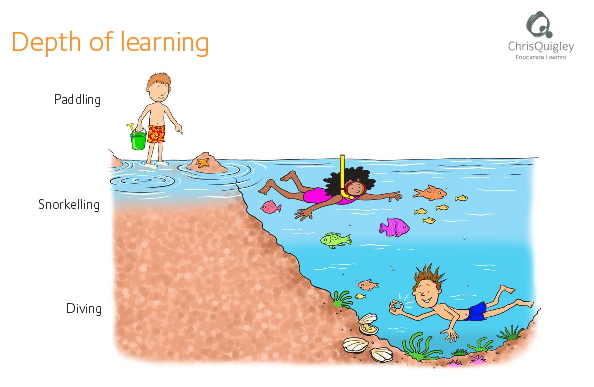The Chris Quigley Essentials Curriculum
We have chosen to follow the Chris Quigley Essentials Curriculum which sets out essential coverage, learning objectives and standards which are required for all subjects. Furthermore, it provides progress measures for all subjects including personal development.
One of the primary reasons why we have chosen to adopt this curriculum is because it emphasises the importance of developing the depth of children’s learning. In essence, this means providing children with increased cognitive challenge, allowing them to apply the skills which they have learnt independently in a range of contexts rather than moving them onto the next skill needlessly when they have not truly mastered it. Such thinking is encapsulated in the scenario below:
CURRICULUM INTENT STATEMENT
At North Duffield Primary School we enable all children to achieve our school vision, "Growing Learners for Life," Every child will make good or better progress because of the quality of teaching they will receive. We model and promote an inclusive ethos so our learners are flexible, imaginative, responsible and confident life - long learners, who value “Rights, Respect, Responsibility and Independence.”
Through the direct teaching of metacognition strategies: resilience, reciprocity, resourcefulness and reflection, we develop our children’s learning behaviours thus enabling them to become lifelong learners and valued members of the communities in which they live.
We celebrate the uniqueness of every child and that they all learn in different ways and our provision reflects this. All staff take responsibility for driving continual improvement in teaching standards, in direct response to the needs of our children.
Intent
Our curriculum aims and basic principles are based on Chris Quigley’s Essential Curriculum and ensure that our pupils experience a wide breadth of study and, by the end of each key stage, have developed long-term memory of an ambitious body of procedural and semantic knowledge.
Curriculum drivers shape our curriculum breadth and have been derived from an exploration of the backgrounds of our students, our beliefs about high quality education and our values.
- Diversity – to widen our children’s knowledge and understanding of the wider community and global community
- Possibilities – to challenge stereotypes; for example, roles of women and ethnic stereotypes
- Spirituality – to believe there is hope in certain situations and things can change for the better
They are used to ensure we give our students appropriate and ambitious curriculum opportunities.
Cultural capital (an individual who is knowledgeable about a wide range of culture, is comfortable discussing its value and merits, and has been given a vast array of experiences and access to skill development) gives our students the vital background knowledge required to be informed and thoughtful members of our community who understand and believe in British values.
Curriculum Breadth is shaped by our curriculum drivers, cultural capital, subject topics and our ambition for students to study the best of what has been thought and said by many generations of academics and scholars.
Threshold concepts tie together the subject topics into meaningful schema. The same concepts are explored in a wide breadth of topics. Through this ‘forwards-and-backwards engineering’ of the curriculum, students return to the same concepts over and over and gradually build understanding of them.
Threshold concepts are split into three milestones. Our progression model uses a different pedagogical style in each of the cognitive domains (Basic, Advance & Deep). Pupils master the basics through direct instructions in the early stages (Basic Domain) before developing problem solving and discovery in the deeper stage. The Proof of Progress tasks are part of our curriculum that shows expectations in each domain.
We are currently updating each subject area to match the intent of our curriculum.
Cognitive science tells us that working memory is limited and that cognitive load is too high if students are rushed through content. This limits the acquisition of long-term memory. Cognitive science also tells us that in order for students to become creative thinkers, or have a greater depth of understanding they must first master the basics, which takes time.
Implementation
Our curriculum design is based on evidence from cognitive science; three main principles underpin it:
- Learning is most effective with spaced repetition
- Interleaving helps pupils to discriminate between topics and aids long-term retention.
- Retrieval of previously learned content is frequent and regular, which increases both storage and retrieval strength.
In addition to the three principles, we also understand that learning is invisible in the short-term and that sustained mastery takes time.
Our content is subject specific. We make intra-curricular links to strengthen schema.
Continuous provision, in the form of daily routines, replaces the teaching of some aspects of the curriculum and, in other cases, provides retrieval practise for previously learned content.
Impact
Because learning is a change to long-term memory it is impossible to see impact in the short term. We do however use probabilistic assessment based on deliberate practise. This means that we look at the practices taking place to determine whether they are appropriate, related to our goals and likely to produce results in the long-run.
We use comparative judgement in comparing a student’s work over time. We use lesson observations to see if the pedagogical style matches our depth expectations.

